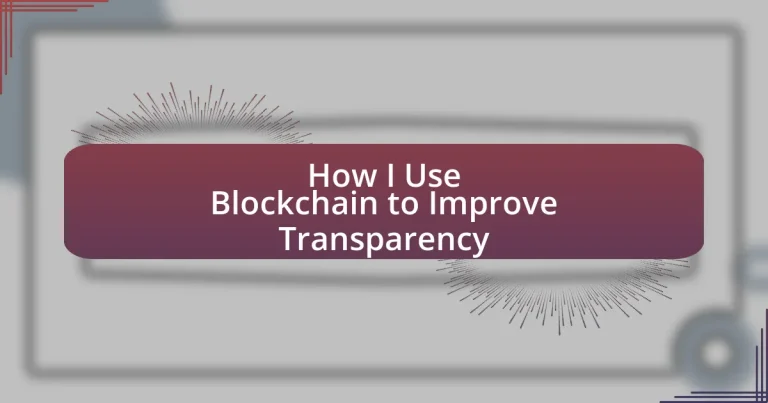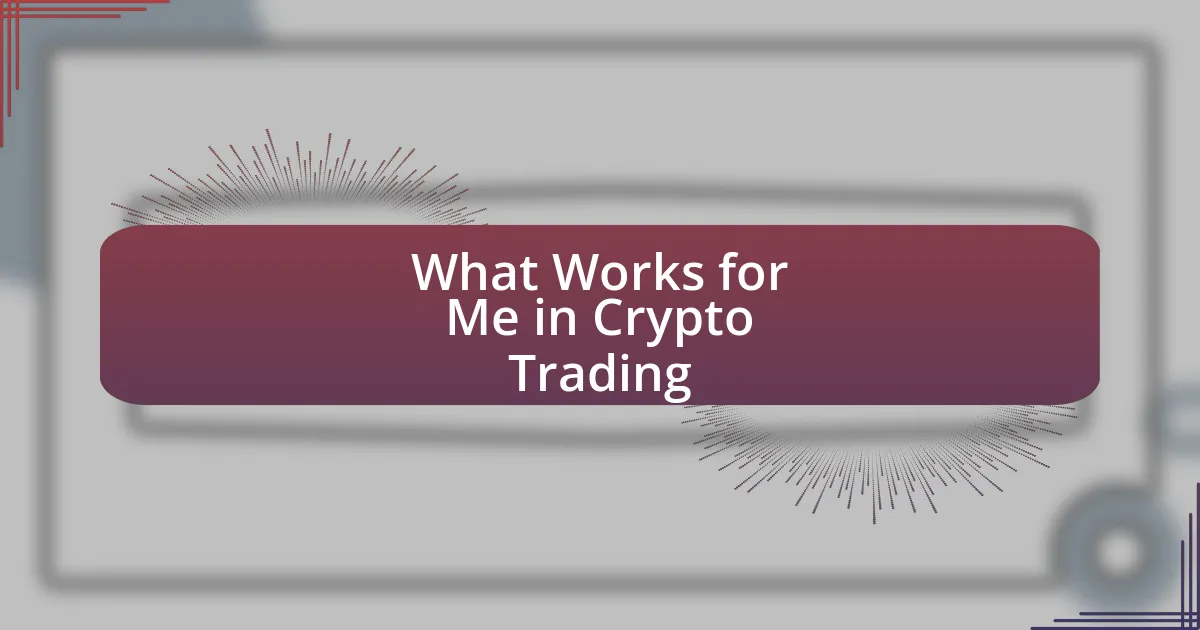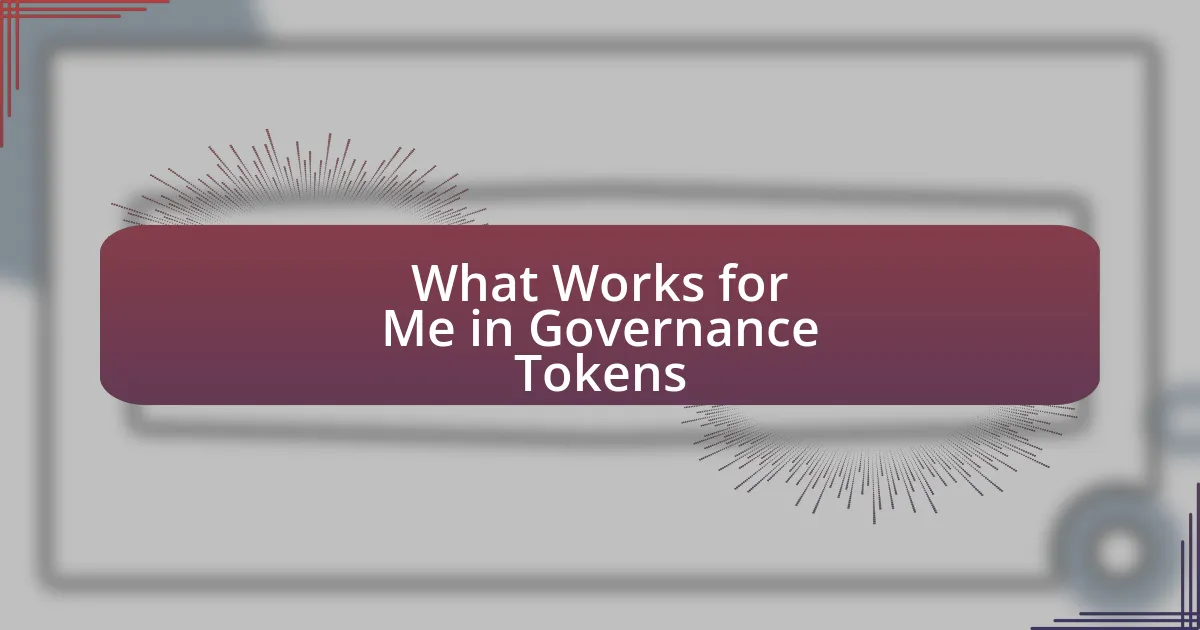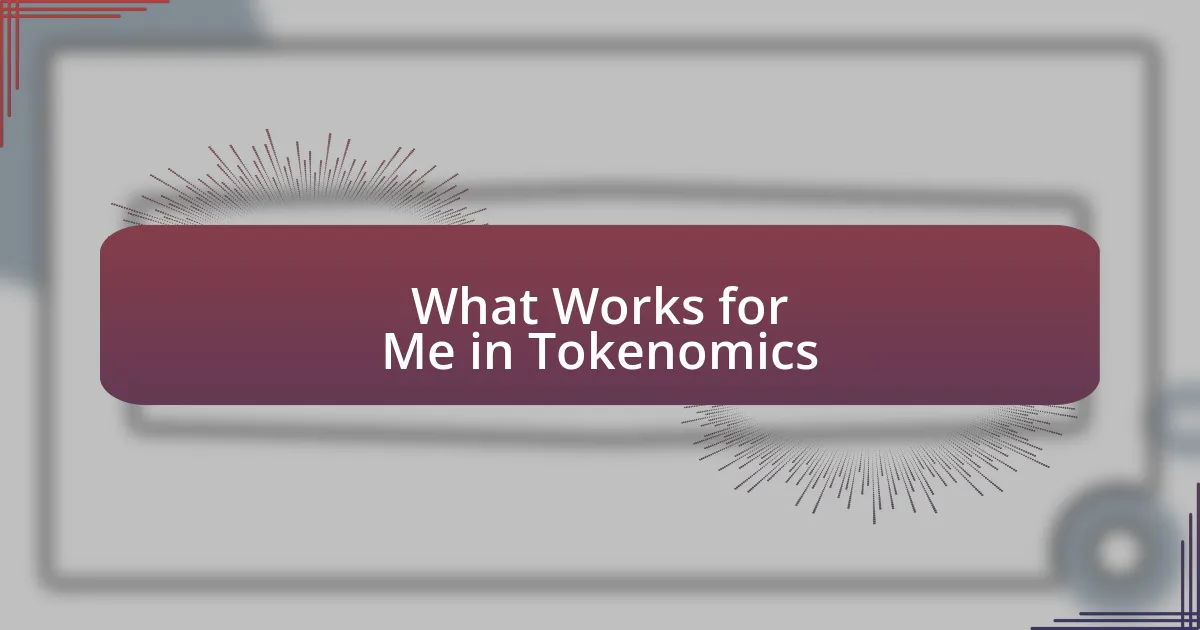Key takeaways:
- Blockchain provides a decentralized, immutable ledger that enhances trust and transparency in transactions.
- Smart contracts automate accountability and reduce reliance on intermediaries, streamlining processes in various applications.
- Real-time tracking in supply chains boosts consumer confidence and ensures product authenticity.
- Blockchain technology significantly improves the efficiency and security of financial transactions while reducing fraud.
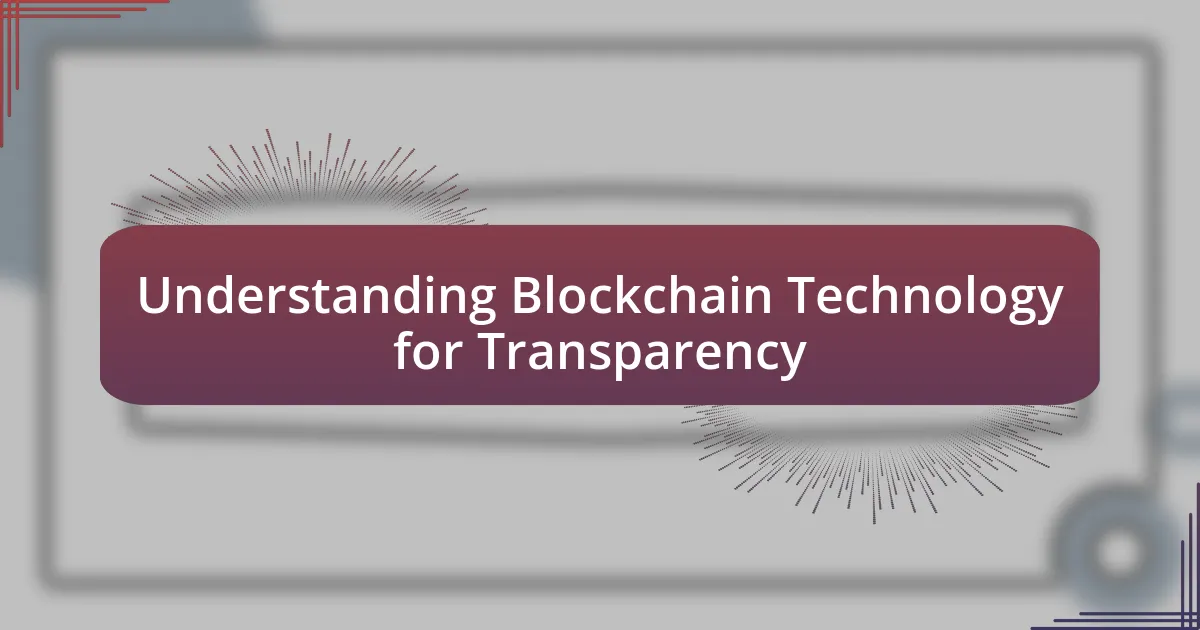
Understanding Blockchain Technology for Transparency
Blockchain technology is fascinating because it offers a decentralized and immutable ledger, which means that once something is recorded, it cannot easily be changed or deleted. This feature alone gives me a sense of security; I can track transactions and data confidently, knowing that the history is preserved. Have you ever lost trust in a system? Understanding how blockchain maintains integrity can restore that faith.
In my experience, transparency is critical in building relationships, whether in business or personal interactions. With blockchain, every participant has access to the same information, eliminating discrepancies that often lead to misunderstandings. I remember a project where we used blockchain to track supply chains, and seeing all parties involved in real-time fostered a collaborative atmosphere. Isn’t it empowering to know that everyone is operating from the same page?
Moreover, the potential of smart contracts—self-executing contracts with the agreement directly written into code—has transformed how we can enforce accountability. For example, I’ve implemented smart contracts in a few projects to automate compliance checks. This reduced reliance on middlemen, speeding up processes and increasing trust. Doesn’t that sound like a more efficient way to ensure agreements are honored?
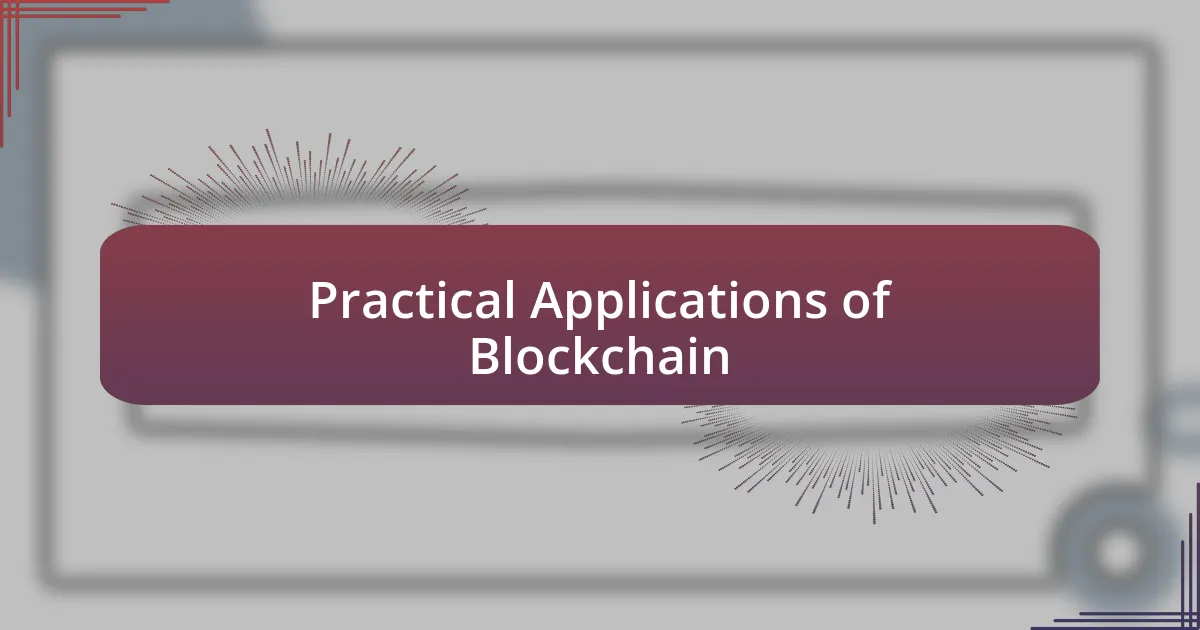
Practical Applications of Blockchain
Blockchain has practical applications in various sectors that benefit from enhanced transparency. For instance, in the supply chain industry, I’ve seen firsthand how blockchain can create a more transparent process. By enabling real-time tracking, everyone from suppliers to consumers can trace the journey of a product. Imagine knowing the exact origin of your food; it’s a reassuring thought, isn’t it?
In finance, blockchain empowers individuals with greater control over their assets. I once participated in a financial project that used blockchain for peer-to-peer lending. We were able to eliminate cumbersome paperwork and enhance trust between lenders and borrowers. Isn’t it incredible how this technology can facilitate direct relationships while maintaining transparency?
Another area where blockchain shines is in election integrity. Participating in a community election that utilized blockchain technology gave me a new perspective on transparency in governance. The thought that every vote is recorded immutably created a sense of trust that I had not experienced before. Don’t you think it’s crucial for democracy to have such levels of integrity?
| Application | Description |
|---|---|
| Supply Chain | Real-time tracking of products enhances transparency for all parties involved. |
| Finance | Peer-to-peer lending reduces reliance on intermediaries while providing clear records of transactions. |
| Election Integrity | Immutable voting records ensure trust and transparency in the electoral process. |
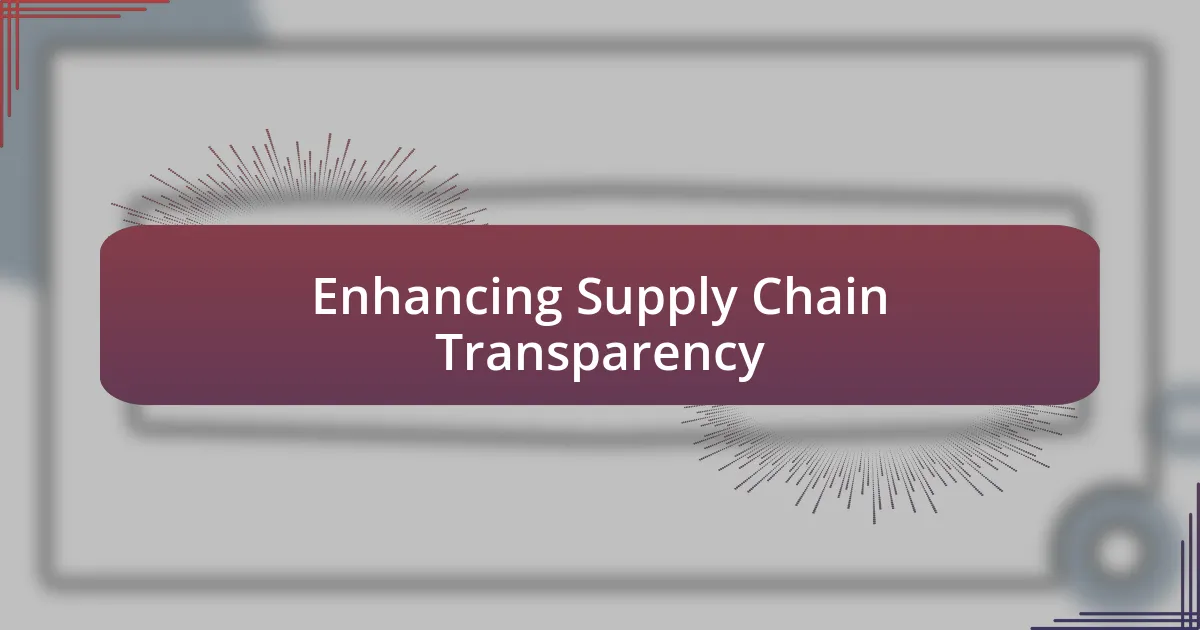
Enhancing Supply Chain Transparency
When I think about enhancing supply chain transparency, the idea of blockchain immediately comes to mind. In one memorable instance, I worked with a food distribution company that adopted this technology. They were able to trace the source of their products in a matter of seconds, and the peace of mind that came with knowing where each item originated was truly invaluable. This capability not only reassured stakeholders but also fostered consumer trust, which is increasingly important in a market fraught with concerns about food safety and quality.
- Real-time product tracking reduces the risk of fraud and contamination.
- Immutable records ensure accurate history and authenticity of products.
- Enhanced accountability among suppliers leads to better practices.
- Consumers gain confidence in the products they purchase, understanding their origins and journey.
Seeing the difference blockchain made in that supply chain was remarkable. It wasn’t just about efficiency; it was about restoring trust in the entire process. I remember a conversation with a customer who expressed relief knowing they could VERIFY their food’s journey from farm to table. That emotional connection is what makes transparency so vital; it makes consumers feel empowered while holding businesses accountable.
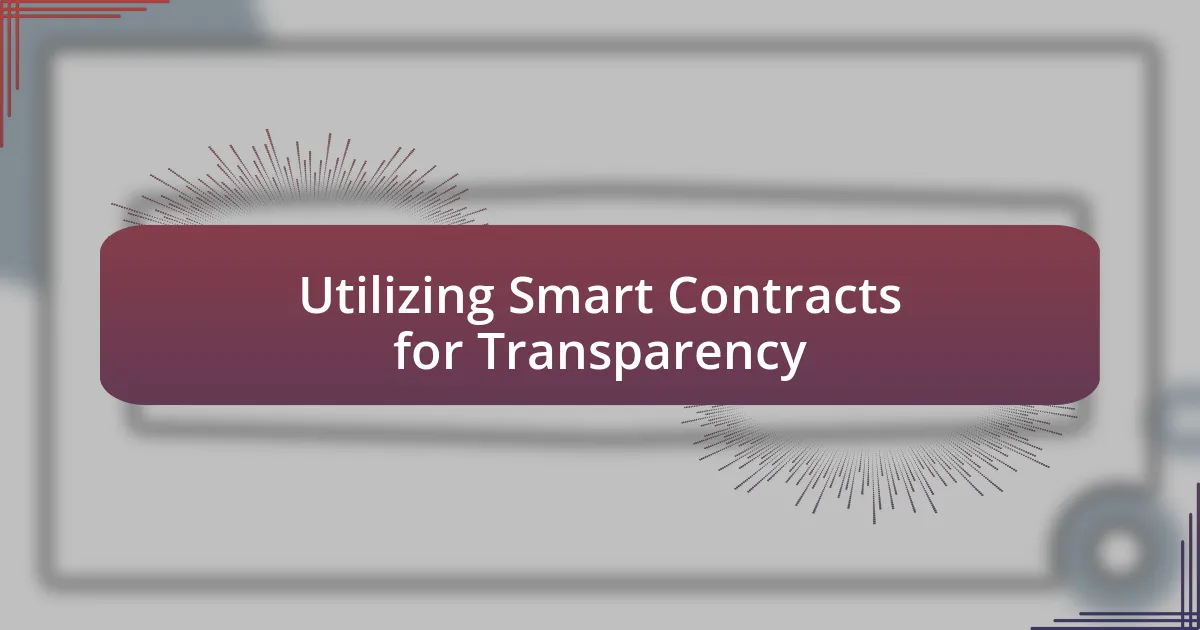
Utilizing Smart Contracts for Transparency
Utilizing smart contracts in blockchain not only enhances transparency but also automates trust. I recall collaborating with a logistics company that implemented smart contracts to enforce agreements between suppliers and distributors. This setting meant that every condition was met before payments were released, providing a layer of security and clarity that was previously lacking. Isn’t it comforting to think that human error could be minimized, simply through automated processes?
The beauty of smart contracts lies in their immutability. When a contract is recorded on the blockchain, it can’t be altered or tampered with, ensuring that the terms are upheld unequivocally. One time, a partner caught a discrepancy in a delivery. Thanks to the clear contractual terms visible to all parties involved, we resolved the issue swiftly. This transparency eliminated misunderstandings and built a stronger partnership; have you ever experienced a situation where clarity restored trust?
Moreover, smart contracts facilitate accountability among all participants in the supply chain. In my experience, when everyone knows that their actions are recorded and verifiable, they tend to adopt better practices. I’ve watched teams transform from merely meeting requirements to striving for excellence, driven by the assurance that their contributions can be transparently monitored. Isn’t that a remarkable shift in mindset?
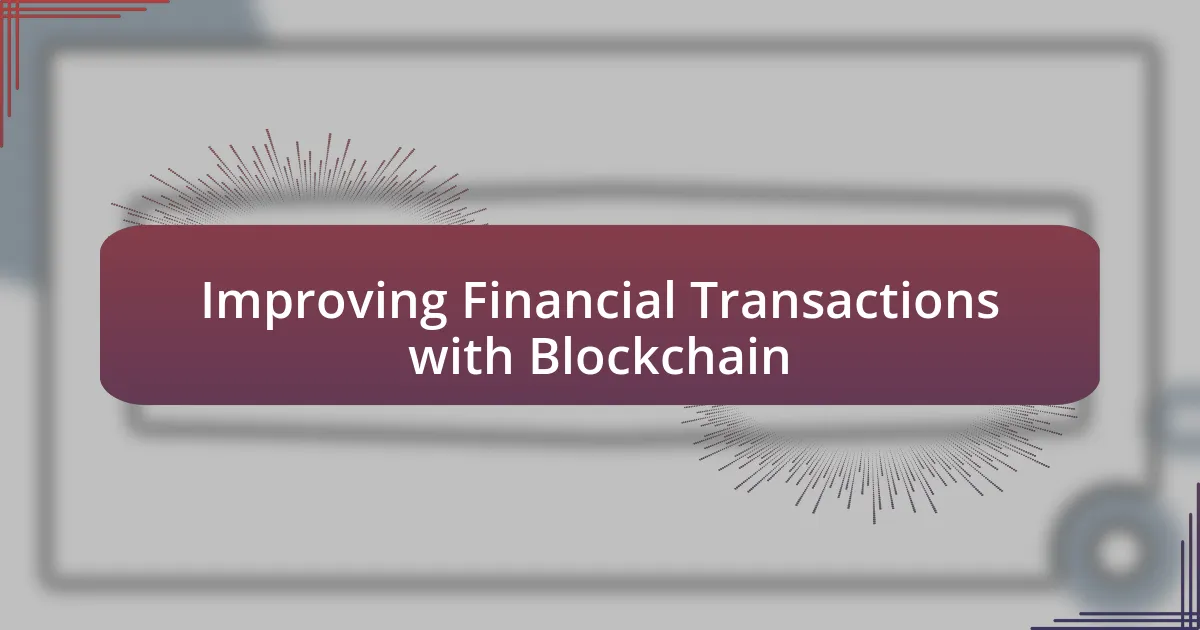
Improving Financial Transactions with Blockchain
Improving financial transactions with blockchain technology offers a level of verification that traditional methods struggle to provide. I remember a time when I was tasked with managing a large-scale payment process that involved multiple stakeholders. The frustration of delays and miscommunications was palpable; however, when we transitioned to a blockchain-based system, funds could be transferred almost instantly, with every transaction recorded and visible to all parties involved. Doesn’t it feel reassuring to know exactly where your money is at every step?
One of the most remarkable aspects of using blockchain in financial transactions is the reduction of fraud. I experienced this firsthand when our company faced increasing incidents of chargebacks from clients. By adopting blockchain, each transaction was securely logged, making it incredibly challenging for fraudulent activities to slip through the cracks. Have you ever thought about how much time and resources could be saved if businesses could confidently reduce their risk of fraud?
Furthermore, the dynamic nature of blockchain technology allows for real-time auditing. I’ve participated in audits where the traditional methods took weeks to complete. With blockchain, we can pull up records in moments, allowing for immediate analysis and adjustments. This instant access not only streamlines processes but also fosters a culture of trust and accountability. Wouldn’t you agree that having instant insights would fundamentally change the way organizations operate?

